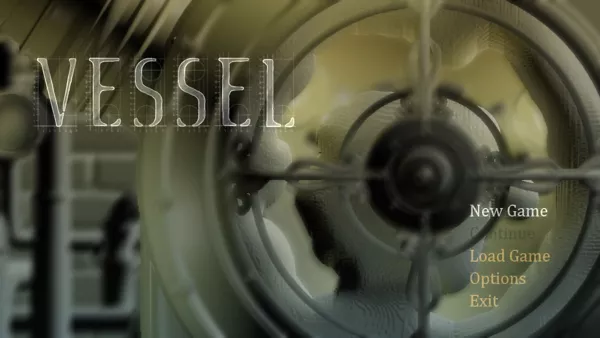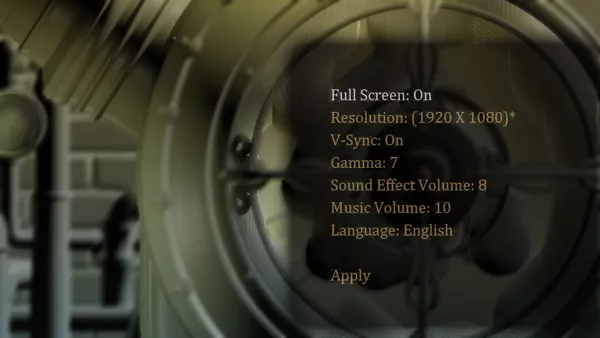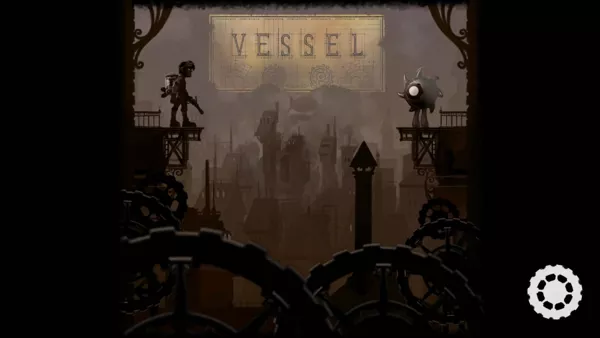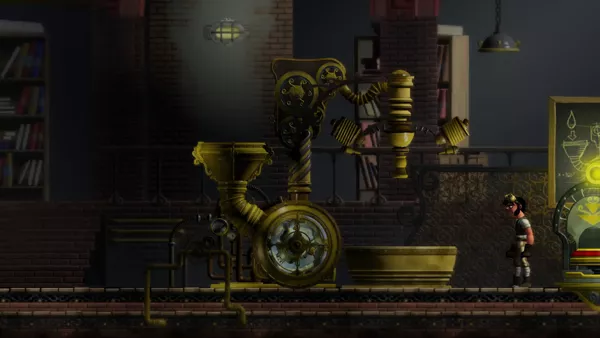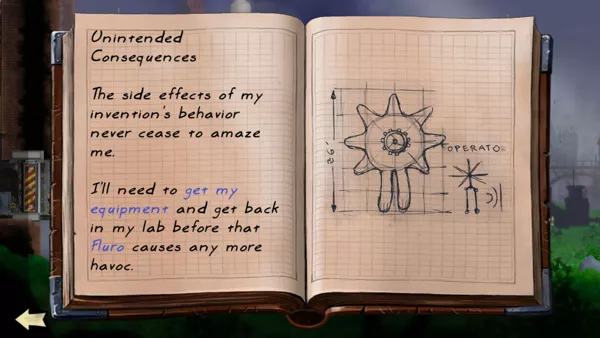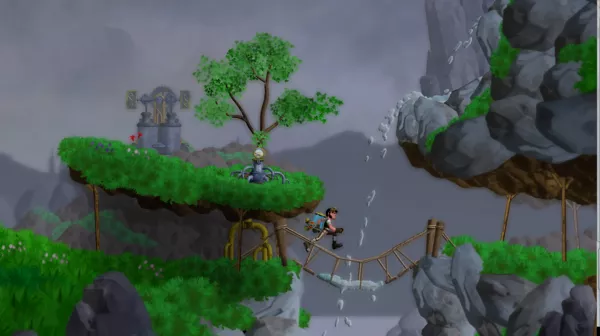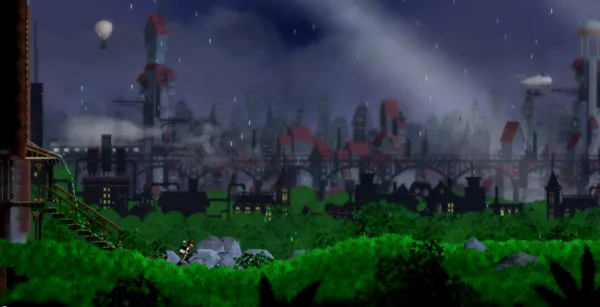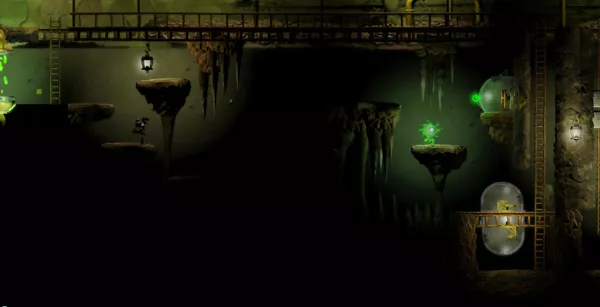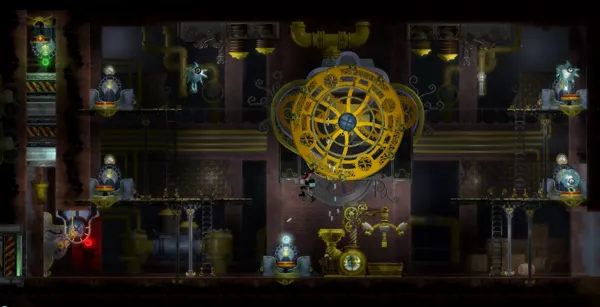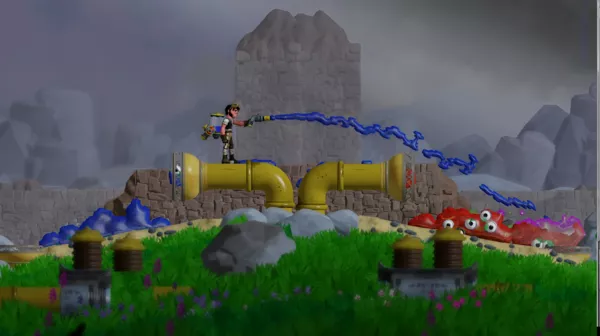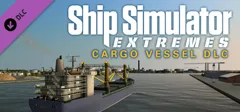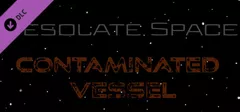Vessel
Description
Vessel is a steampunk-themed platformer entirely built around solving puzzles. Players controls the scientist M. Arkwright who became world famous by inventing Fluros. They are one-eyed creatures that come to life out of liquid. Their behaviour is erratic however and they end up escaping from his control and wreak havoc in his laboratory. To regain control Arkwright has to retrieve his equipment and eventually repair the accelerator in his laboratory. This location acts as the main hub in the game, but from there the player visits three large locations with a distinct environment: the factory, the orchard, and the mines.
The game is played as a 2D platformer. Arkwright can move around and jump. As much of the gameplay is based around manipulating fluids, almost all elements are physics-based. Liquid can be moved around by walking through it and the scientist operates various levers, wheels and buttons. During the game five different fluro types are discovered and they all react differently. There is a water fluro, a lava fluro, an explosion fluro, a light fluro, and a dark fluro. Water fluros for instance fall apart when you bump into them and evaporate when they touch hot surfaces. Dark fluros can only survive in darkness and shun light. These organisms act independently and can only be controlled indirectly by the player. After a while Arkwright acquires the ability to sample fluros through seeds to create them at any location.
Next to the different fluros, they can also be created according to a certain type. Chaser types follow the player, Drinkers are drawn to liquid etc. To solve puzzles a complex combination of fluros and environment-based challenges need to be solved. It is possible to die, but without consequences. Some puzzles contain timing elements or require a quick succession of actions. Arkwright eventually builds a pressurized backpack that allows him to spray liquid in a direction controlled by the mouse to create fluros or manipulate objects in the environment. The amount of liquid is limited, but it can be refilled at pools. The tank can also be filled with other types such as blue pulp or a green chemical when they are discovered. By collecting samples of white protoplasma the backpack can be upgraded in the laboratory with a new type of nozzle for instance.
Groups +
Screenshots
Promos
Videos
Add Trailer or Gameplay Video +1 point
See any errors or missing info for this game?
You can submit a correction, contribute trivia, add to a game group, add a related site or alternate title.
Credits (Windows version)
64 People (57 developers, 7 thanks) · View all
| Graphics | |
| Engine Programming | |
| Technical Art | |
| Art | |
| Design | |
| Production | |
| Physics Programming | |
| Gameplay Programming | |
| Art Direction | |
| Audio Direction | |
| Audio Design | |
| Music Remixing | |
| Music Licensing | |
| Audio Programming | |
| Programming Support | |
| Design Support | |
| Programming | |
| Art | |
| Design | |
| [ full credits ] | |
Reviews
Critics
Average score: 81% (based on 35 ratings)
Players
Average score: 3.4 out of 5 (based on 6 ratings with 1 reviews)
The Good
Fluids. Nothing can live, let alone exist without them. What if the forces and properties of fluids could be harnessed in such a way as to reduce human labor and improve overall quality of life? What if we could create creatures out of fluids? What would happen if those creatures got out of hand? This is the wonderfully intriguing premise behind Vessel, a 2D puzzle platform game that utilizes an advanced fluid physics simulation to bring to life a stunningly realized steampunk world.
The player plays as an inventor, M. Arkwright. His greatest accomplishment is the Fluro, a fluid-based creature that was created to perform dangerous and menial human labor tasks, not unlike a robot. Although the invention is a success, it does have a tendency to run amok, which is not necessarily appreciated by society. One day, the inventor gets locked outside of his lab by a recently created Fluro. This is where the game officially begins. Your goal as Arkwright is to navigate screen after screen of puzzles, working your way to the end of the game as the inventors’ newest, and greatest plans slowly become realized, leading up to a tantalizing and oddly strange ending.
Like many puzzle games before it, Vessel starts you off with only the most basic of abilities and gradually introduces new elements as the levels get more complex. At the start of the game, you can only run and jump, which is just enough to knock over buckets of water and hit switches. The inventor gains the ability to set down Fluro “seeds”, which attract fluids. When the seed has enough fluid surrounding it, it becomes a Fluro, and behaves differently depending on both the seed itself as well as the fluid used to form it.
The standard Operator seed is attracted to hitting the nearest available ready switch, helping you get through some doors but also hindering you with others. The Chaser attempts to follow the player, and when it is close enough, explodes. This can be very harmful if the chaser is made of lava. The Drinker tries to find the nearest source of its own fluid and “drinks” from it to expand its size. If it drinks too much, it will explode. Finally, there are the Light and Dark Fluros, which are attracted to light and dark areas, respectively. If they spend too long in their undesired lighting, they will melt, which is actually necessary for solving some puzzles.
Besides the seeds, Arkwright also invents his own nozzle pack, which can shoot fluids in the direction of the player’s mouse, as well as suck them up. Though you can only suck up water at the start, eventually you can carry up to four different fluids at any given moment. The pack is necessary both for solving puzzles, as well as navigating environmental hazards such as lava and darkness. Not every fluid in the game can be carried, however, and this is where you have to get creative if you need to use one of the un-storable fluids.
In addition, there are some optional puzzles that can be solved to gain a fluid called “protoplasm”. Protoplasm is a white glowing liquid that you can use to upgrade your nozzle to an optional “super” nozzle, which has the ability to shoot out a fluid and seed at the same time, providing instant fluro action. Though there are a lot of puzzles in Vessel, not every single one has to be solved to finish the game. In later areas of the game, your goal is to fix machines that the Fluros have messed with. To get to the machines, you’ll have to solve a puzzle nearby to open a door to where the machine is located. However, if you decide that the puzzle is too hard for you to solve at that particular time, you can take another route to the next room instead. There are typically 6 machine puzzles in these areas, and five of them have to be solved to continue the game. If you do manage to solve all of the puzzles, you get access to a store of protoplasm. If you decide to skip a puzzle for whatever reason, the game allows you to warp back to it if you decide to give it another chance, which was an excellent feature to include on Strange Loop’s part.
The graphics in Vessel are simply outstanding. The game is entirely in 2D, but utilizes advanced lighting and pixel shader effects to give the illusion that it’s not. It sounds odd, but in motion looks absolutely stunning. Its proof positive that modern hardware can make even “simple” 2D games look as great as the latest AAA release. In addition, the art design is outstanding, offering a realistic and atmospheric steampunk world that you’ll marvel at over and over again. Much of the machinery is made of pipes, steam, gears, valves and ladders. You’ll actually interact with these objects using the game’s physics-based animation system for Arkwright. For example, to turn a crank, you’ll press the movement keys around in a circle until the crank can move no more. Watching Arkwright perform some of these actions admittedly does look a bit awkward, but it’s not a huge blemish on the overall graphics quality. Of course, the main focus of the game, the fluid physics, really steal the show. All of the fluids move in different ways, and collision detection with them is very accurate. Water is fairly slippery and clear, while glowing goo sticks to the walls and ceilings and seems to fall apart in clumps, not drops. A couple of the fluids have lighting effects surrounding them, creating great looking scenes as they splash around. My favorite scenes of the game, graphically, are when Arkwright uses a machine to travel down a shaft or tunnel. As you travel through the tunnel, you’ll see the lighting effects give the rocks shape and texture. You may also see Fluros running around, being mischievous and doing strange things. It’s a lonely, slightly unsettling atmosphere that this game does so well.
But what truly makes the presentation outstanding is the sound. Both the sound itself, as well as the sound engine, are cream-of-the-crop. The sound in Vessel is very realistic. For example, when landing off of a platform, the height that you jump from affects the volume of the sound when landing. Echo and reverb are also taken into effect depending on the area that you are exploring. It’s just one example of how well this game does sound. The music complements the game very well, offering an ambient, very sci-fi score that dynamically ratchets up in intensity as you correctly solve a puzzle. I’d love to be able to listen to the soundtrack on its own.
Vessel is deceptively long. I was initially thinking that the game was going to be a super-short, 3-5 hour experience like some major titles I could mention, but I was surprised to discover that the game lasts a good 15 hours! There is a ton of content in Vessel, and I didn’t even solve all of the puzzles when finishing the game. That said, there’s no way to download or create new levels, which does feel like a bit of a missed opportunity, as this is a common feature in many games of this type.
The Bad
Though I would love to recommend Vessel to everyone, there is a major downside that ensures that Vessel might not find the audience it deserves: the system requirements. Not only will you need a fairly recent computer to run the game, you’ll have to have some very beefy specs just to have the game feel solidly playable. The requirements for this game are simply above and beyond what you could reasonably expect out of a 2D independent game, and this is due to both the lighting effects as well as the fluid physics engine. The developers are fully aware that they have made a demanding game, warning players on their website of the high specs. The game was incredibly slow on my 2.5 year old laptop, but I was able to play the game well enough despite the constant input lag and frame skipping. I wouldn’t be surprised if most players would have flat out quit the game altogether had they tried to play at the frame rate I was getting. Putting the resolution as low as it could go helped immensely for much of the game, but as I approached the final stages, the game played like molasses. A couple of the puzzles, all timing-based, were made a lot harder than they should have been due to the framerate. For the first couple of months after I bought the game, I couldn’t even play it because of a bug with my video card that caused the full version to crash immediately on startup. My friend also had the same problem with his computer. Thankfully, the Strange Loop developers seem to really care about the product that they released, and actually fixed this bug after several other users reported it as well. Admittedly, my computer was a very poor choice for a Vessel experience, thankfully the content inside the game was so good it was worth putting up with the technical trouble. There are supposed to be ports in the works for XBLA and PSN, but for now the game is strictly Windows only, so if you don’t want to wait for the ports or don’t have either of those systems, you’ll have to stick to the PC version. That said, Vessel isn’t exactly Crysis, either, and players who upgrade components to their systems on a regular basis will likely run into less issues than I did.
There are also tons of glitches and bugs in the game. A broken machine somehow managed to fix itself while I walked by it. During a boss battle, I got knocked behind a wall I wasn’t supposed to walk through, allowing the boss to come inside the room where I was and flip the switch. Finally, the game likes to crash a lot, usually at rather inopportune times. If Vessel’s design foundation is made of steel, then its technical elements seem to be held together by staples and tape. It’s barely enough to get by. Strange Loop focused on making a great game first, rather than developing a perfect engine. Of course, being such an ambitious title, most of these bugs are forgivable, inevitable, and in the case of the first two, actually helpful.
The Bottom Line
Vessel is a bit on the expensive side as far as these types of games tend to go, but it is arguably the best (2D) puzzle platformer I have ever played, even surpassing the somewhat overrated Braid in terms of overall quality. Its fluid physics, addictive puzzles, and incredible presentation combine to form what will likely end up being the year’s top indie game. That said, the game’s ambitious but shaky tech does hold it back from being a true breakout hit, but if you like puzzle platformers, you should at least try out the demo to see if your hardware can handle it.
Windows · by krisko6 (814) · 2012
Analytics
Identifiers +
Contribute
Are you familiar with this game? Help document and preserve this entry in video game history! If your contribution is approved, you will earn points and be credited as a contributor.
Contributors to this Entry
Game added by Sciere.
PlayStation 3 added by firefang9212.
Game added March 28, 2012. Last modified November 17, 2024.



